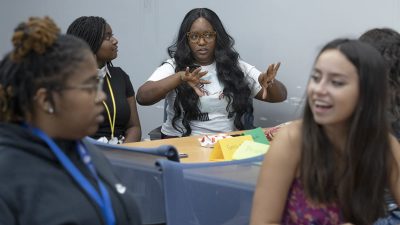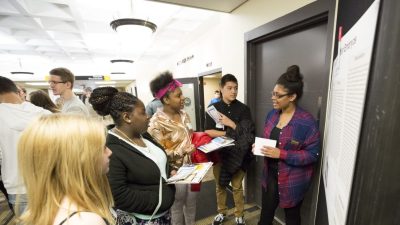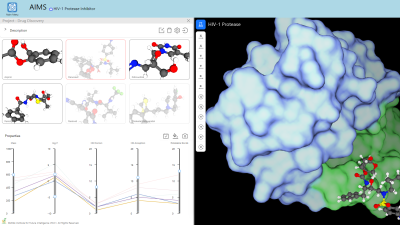PHAGES program, new TEM electron microscope at Montana Technological University opens up possibilities for high school scholars
On a computer screen, the tailed virus appears to be about six inches long. The crisp image may look puzzling to untrained eye, but to the school teachers taught to use Montana Technological University’s new state-of-the-art scanning/transmission electron microscope the image clearly shows a bacteriophage, a virus that can infect and replicate only in bacterial cells.
Phages are is invisible to the naked eye, but the power of Tech’s new electron microscope can magnify its size on the screen to one million times its actual scale. It provides a powerful illustration tool to the teachers as they lead thousands of Montana schoolchildren in a quest to discover as many phages as possible, all while delivering a distinct high-quality STEM education.
“I have to explain to students that this isn’t a ‘normal ‘high school activity,” Capital High School Biology teacher Sarah Urban said. “It’s an incredible opportunity. The engagement of students is really high when they work on this project.”
The PHAGES Program (Phages Helping Acquire Genuine Experiences in Science) started in 2005 and has connected more than 13,000 Montana high school students with the ability to discover viruses previously uncatalogued by scientists. As part of the program, Dr. Marisa Pedulla travels to middle and high school classrooms across the state and helps students learn to collect samples from their own backyard. The students are taught how to handle pipets, Petri dishes, filters and other equipment needed to isolate new-to-science phages. The teachers then take those samples to Montana Tech’s lab, where they are imaged and compared to phages previously discovered and logged in a database. More than 130 phages have been discovered by middle and high schools as part of the program and more than 15 viral genomes have been annotated with teachers or students as authors.
The program has been so successful that Pedulla has been awarded two National Institutes of Health, Science Education Partnership Award in 2014 and 2019 to fund the program’s continuance and expansion. The total value of those awards was $2.55 million.
Jefferson High School biology teacher Steve McCauley says that discovering phages is kind of like lightning, in that you never know when it’s going to happen.
“We found two phages in 2015, in the same classroom, at the same table,” McCauley said. “I explain that to the students and it makes them pretty excited when they bring in their sample.”
The PHAGES program has provided a spark of interest for STEM learning in some students in McCauley’s classroom. A handful have gone on to conduct research with Montana Tech during summers prior to attending college, and continued to expand their education and research skills as Montana Tech undergraduate students.
The new microscope is just a 40-minute drive from McCauley’s school in Boulder, much closer than Bozeman or Missoula, where the program previously had to travel to process samples. It means expanded availability to the PHAGES participants and their students. The equipment is also top-of-the-line and has technical features not available in either Bozeman or Missoula.
“It’s a piece of equipment you just think you’ll never get to use,” McCauley said. “It’s newer and cutting edge. It can magnify things by 1 million times. It’s mind-blowing. It is incredible for this to be available to us at the high school level. As continuing education for teachers, this is the best program I’ve ever been a part of.”
The Hitachi 7820 will strengthen Montana Tech’s PhD programs (in Materials Science and Earth Science and Engineering), enable undergraduate research, support state-wide public service and characterization performed by the campus’s Montana Bureau of Mines and Geology, and inspire K-12 students and teachers served by the Clark Fork Watershed Education Program (CFWEP). The ability to capture and convey the beauty of the biological, mineral and nano-scale worlds to K-12 students will spark interest in scientific careers, increase science literacy, and has the potential to combat scientific misinformation.






